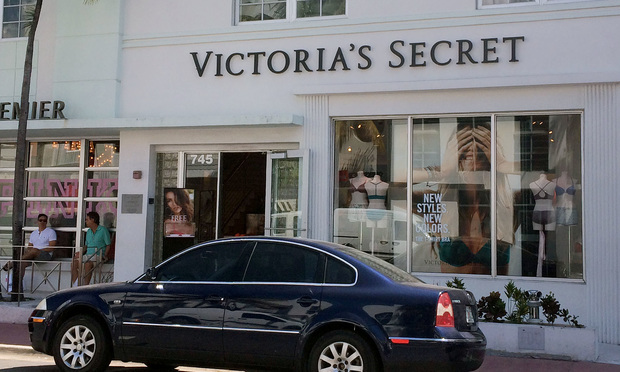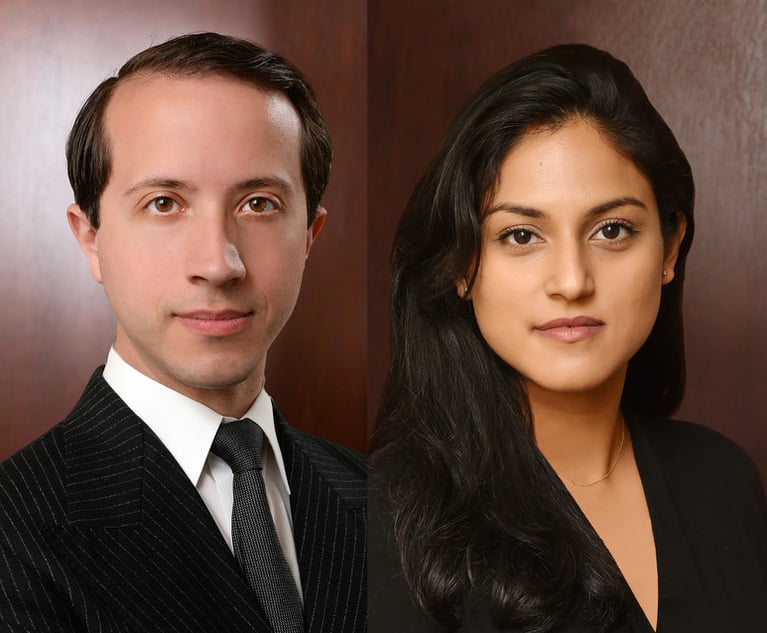Daily Dicta: Clean Break: Kirkland Client Can Walk Away From $525M Victoria's Secret Deal
On Monday, private equity firm Sycamore Partners and Victoria's Secret parent company L Brands settled what was shaping up as a blockbuster fight in Delaware Chancery Court when both sides agreed to walk away from their pending $525 million deal.
May 04, 2020 at 11:18 PM
5 minute read
 Victoria's Secret at 745 Collins Ave.
Victoria's Secret at 745 Collins Ave.
Some engagements are just not meant to last. Gwyneth Paltrow and Brad Pitt. Jennifer Lopez and Ben Affleck.
And now, Sycamore Partners and L Brands.
On Monday, the private equity firm and the Victoria's Secret parent company settled what was shaping up as a blockbuster fight in Delaware Chancery Court when both sides agreed to walk away from their pending $525 million deal.
"Neither party will be required to pay the other a termination fee or other consideration as a result of the mutual decision to terminate the agreement and settle the pending litigation," Sycamore stated in a news release.
(Does that mean they can still be friends?)
The outcome looks like a big win for Sycamore—represented by Kirkland & Ellis lawyers including complex commercial litigation partner Robert Ellis and litigation associate Michael Biehl—which wanted out of its offer to buy a 55% stake in Victoria's Secret after COVID-19 broke the economy.
 On April 22, Sycamore filed suit in Chancery Court, seeking a declaratory judgment that its decision to terminate the transaction was valid.
On April 22, Sycamore filed suit in Chancery Court, seeking a declaratory judgment that its decision to terminate the transaction was valid.
The Kirkland team argued L Brands breached the terms of the agreement when it failed to conduct the Victoria's Secret business "in the ordinary course consistent with past practice" while the deal, which was signed on Feb. 20, 2020, was pending.
Of course, business as usual promptly went out the window when the country went into a lockdown. All 1,091 Victoria's Secret stores (lingerie, alas, is a non-essential business) in the U.S. and Canada were closed by March 17.
L Brands took non-government ordered actions as well, such as not paying rent in April for its retail locations and furloughing most of its employees. New merchandise was drastically reduced and the stores were stuck with out-of-season, obsolete and excess merchandise.
Still, a pandemic is no excuse, argued the Kirkland team along with co-counsel from Richards, Layton & Finger.
"[T]he transaction agreement is clear that the risk of L Brands' failure to operate the Victoria's Secret business in the ordinary course consistent with past practice between signing and closing, even in the face of events such as the COVID-19 pandemic, is to be expressly and completely borne by L Brands," they wrote.
L Brands, represented by Davis Polk & Wardwell, responded by counter-suing Sycamore in Delaware the next day.
"[T]his is a case of a buyer trying to get out of a deal because of the impact of the COVID-19 pandemic," wrote Davis Polk's Andrew Ditchfield, Brian Burnovski, Serena Wu and Patrick Malone, joined by co-counsel from Morris, Nichols, Arsht & Tunnell.
"But Sycamore ignores a fundamental problem with its apparent case of buyer's remorse," they continued. "At the time the parties negotiated the agreement, the world was already well aware of the existence of COVID-19, and the parties agreed that Sycamore would bear the risk of any adverse impacts stemming from such a pandemic."
Litigation involving material adverse effects is usually of narrow (albeit intense) interest, but this case—involving a well-known retailer and the impact of COVID-19—was widely covered.
The New York Times on April 29 gave Davis Polk a Valentine of sorts when it published an article headlined "The Victoria's Secret Contract That Anticipated a Pandemic," which lauded the firm's contract drafting skills.
"Sycamore faces unusually daunting odds, thanks to clever drafting by L Brands' lawyers at Davis Polk & Wardwell. In the acquisition agreement, the lawyers carved out specific exceptions to those acts of God, including a pandemic," wrote columnist James B. Stewart.
"By all accounts," Stewart continued, "the L Brands-Sycamore contract was the product of hard-fought negotiations, but there's no evidence that Sycamore's lawyers at Kirkland & Ellis pushed back against the pandemic language. Should they have?"
So … that kind of makes it sound like the Kirkland lawyers got snookered. But the actual settlement—which appears to give Sycamore exactly what it wanted—indicates otherwise.
Sycamore argued that the pandemic carve-out didn't matter. Rather, the deal could be killed based on any "facts, circumstance or event that would prevent or materially impede the performance by L Brands of its obligations under the transaction agreement."
Technically, the pandemic itself wasn't the material adverse effect. It was when L Brands closed all the Victoria's Secret stores/didn't pay rent/furloughed its workers/got stuck with stale inventory.
That, the Kirkland team wrote, was what "constitutes a material adverse effect causing a failure of a condition to closing."
Who is the clever drafter now?
L Brands in a statement said that given the "extremely challenging" retail environment, it was in the company's best interest "to focus our efforts entirely on navigating this environment to address those challenges and positioning our brands for success rather than engaging in costly and distracting litigation to force a partnership with Sycamore."
This content has been archived. It is available through our partners, LexisNexis® and Bloomberg Law.
To view this content, please continue to their sites.
Not a Lexis Subscriber?
Subscribe Now
Not a Bloomberg Law Subscriber?
Subscribe Now
NOT FOR REPRINT
© 2025 ALM Global, LLC, All Rights Reserved. Request academic re-use from www.copyright.com. All other uses, submit a request to [email protected]. For more information visit Asset & Logo Licensing.
You Might Like
View All
How Kirkland Litigators and Restructuring Lawyers Partner on Bankruptcy Work

Litigators of the Week: Hitting Walmart With a $100M Verdict in Its Own Backyard

Litigator of the Week: Standing Strong for Under Armour's Trademarks Without Going Overboard Against Upstart Armorina

How a Luxury Designer Made the Case 'Adidas Does Not Own Stripes'
Law Firms Mentioned
Trending Stories
- 1January Petitions Press High Court on Guns, Birth Certificate Sex Classifications
- 2'A Waste of Your Time': Practice Tips From Judges in the Oakland Federal Courthouse
- 3Judge Extends Tom Girardi's Time in Prison Medical Facility to Feb. 20
- 4Supreme Court Denies Trump's Request to Pause Pending Environmental Cases
- 5‘Blitzkrieg of Lawlessness’: Environmental Lawyers Decry EPA Spending Freeze
Who Got The Work
J. Brugh Lower of Gibbons has entered an appearance for industrial equipment supplier Devco Corporation in a pending trademark infringement lawsuit. The suit, accusing the defendant of selling knock-off Graco products, was filed Dec. 18 in New Jersey District Court by Rivkin Radler on behalf of Graco Inc. and Graco Minnesota. The case, assigned to U.S. District Judge Zahid N. Quraishi, is 3:24-cv-11294, Graco Inc. et al v. Devco Corporation.
Who Got The Work
Rebecca Maller-Stein and Kent A. Yalowitz of Arnold & Porter Kaye Scholer have entered their appearances for Hanaco Venture Capital and its executives, Lior Prosor and David Frankel, in a pending securities lawsuit. The action, filed on Dec. 24 in New York Southern District Court by Zell, Aron & Co. on behalf of Goldeneye Advisors, accuses the defendants of negligently and fraudulently managing the plaintiff's $1 million investment. The case, assigned to U.S. District Judge Vernon S. Broderick, is 1:24-cv-09918, Goldeneye Advisors, LLC v. Hanaco Venture Capital, Ltd. et al.
Who Got The Work
Attorneys from A&O Shearman has stepped in as defense counsel for Toronto-Dominion Bank and other defendants in a pending securities class action. The suit, filed Dec. 11 in New York Southern District Court by Bleichmar Fonti & Auld, accuses the defendants of concealing the bank's 'pervasive' deficiencies in regards to its compliance with the Bank Secrecy Act and the quality of its anti-money laundering controls. The case, assigned to U.S. District Judge Arun Subramanian, is 1:24-cv-09445, Gonzalez v. The Toronto-Dominion Bank et al.
Who Got The Work
Crown Castle International, a Pennsylvania company providing shared communications infrastructure, has turned to Luke D. Wolf of Gordon Rees Scully Mansukhani to fend off a pending breach-of-contract lawsuit. The court action, filed Nov. 25 in Michigan Eastern District Court by Hooper Hathaway PC on behalf of The Town Residences LLC, accuses Crown Castle of failing to transfer approximately $30,000 in utility payments from T-Mobile in breach of a roof-top lease and assignment agreement. The case, assigned to U.S. District Judge Susan K. Declercq, is 2:24-cv-13131, The Town Residences LLC v. T-Mobile US, Inc. et al.
Who Got The Work
Wilfred P. Coronato and Daniel M. Schwartz of McCarter & English have stepped in as defense counsel to Electrolux Home Products Inc. in a pending product liability lawsuit. The court action, filed Nov. 26 in New York Eastern District Court by Poulos Lopiccolo PC and Nagel Rice LLP on behalf of David Stern, alleges that the defendant's refrigerators’ drawers and shelving repeatedly break and fall apart within months after purchase. The case, assigned to U.S. District Judge Joan M. Azrack, is 2:24-cv-08204, Stern v. Electrolux Home Products, Inc.
Featured Firms
Law Offices of Gary Martin Hays & Associates, P.C.
(470) 294-1674
Law Offices of Mark E. Salomone
(857) 444-6468
Smith & Hassler
(713) 739-1250






